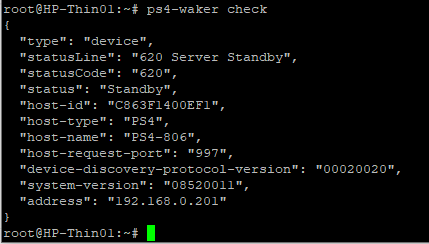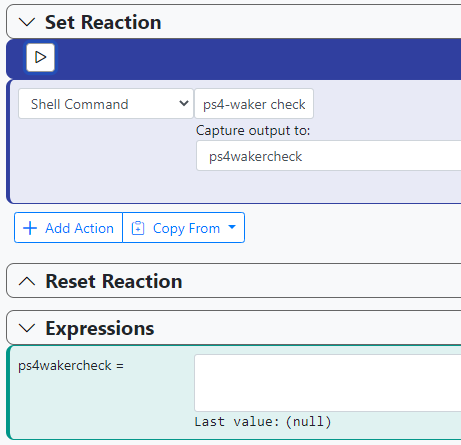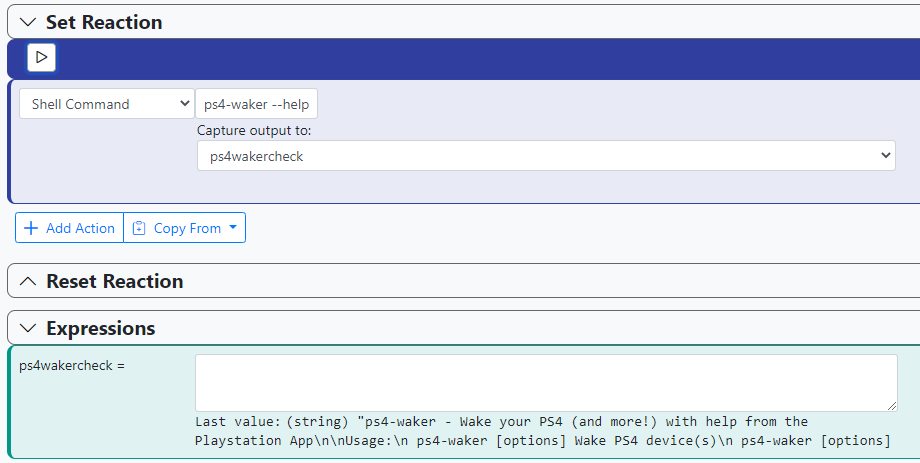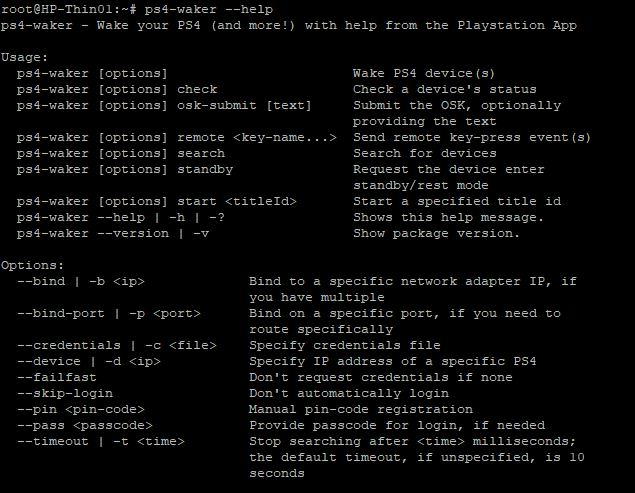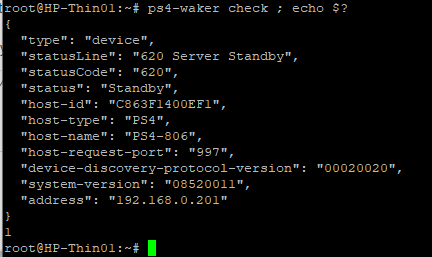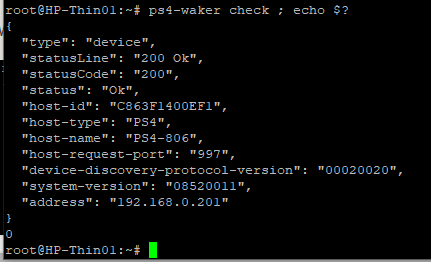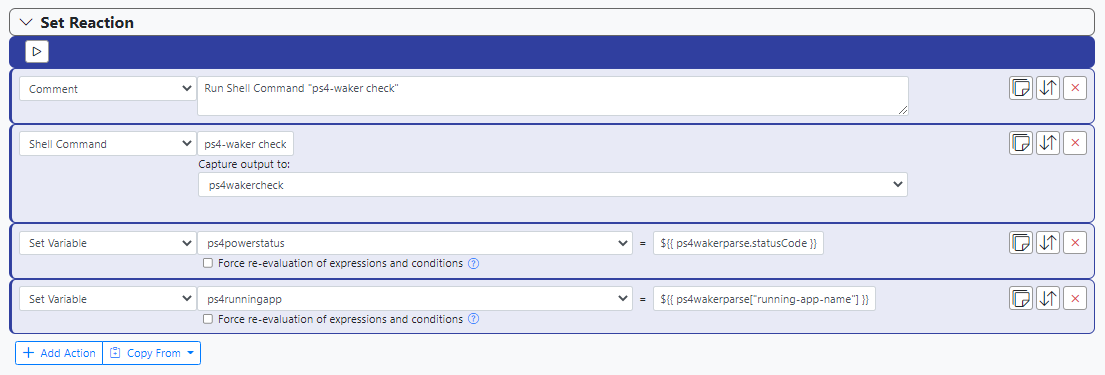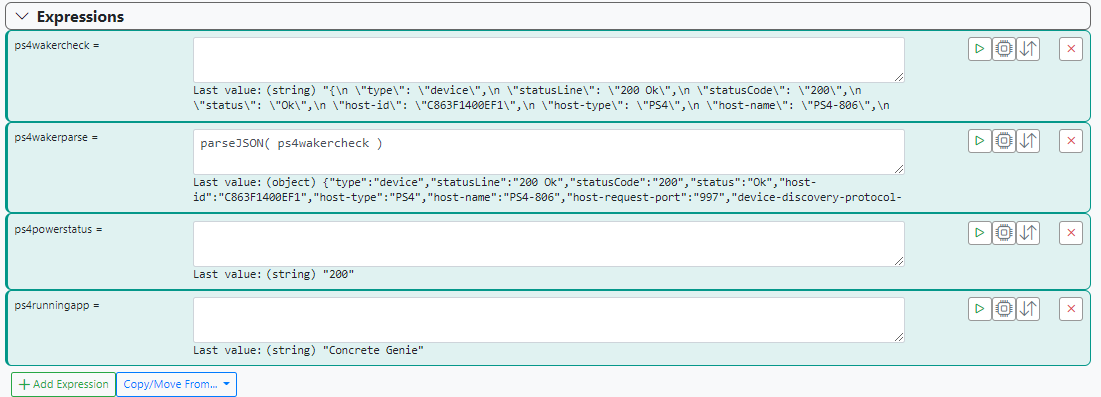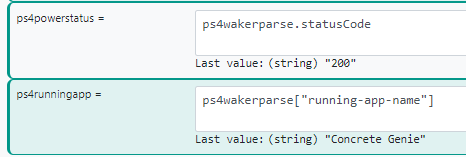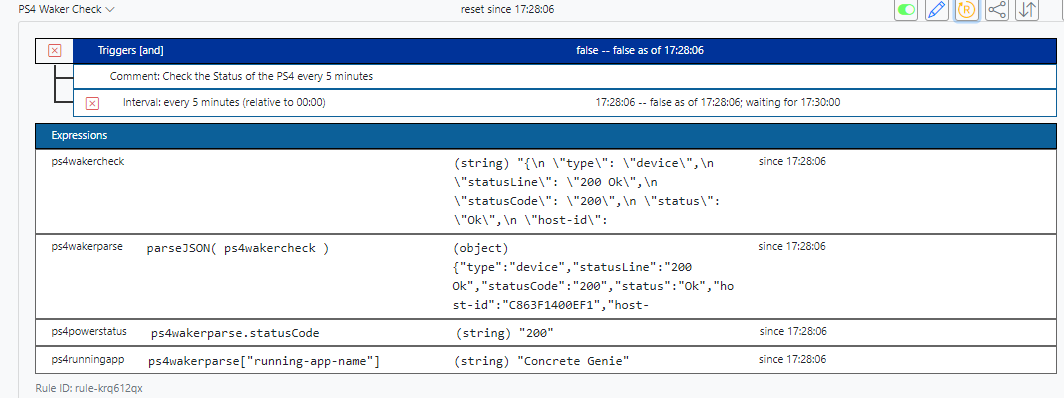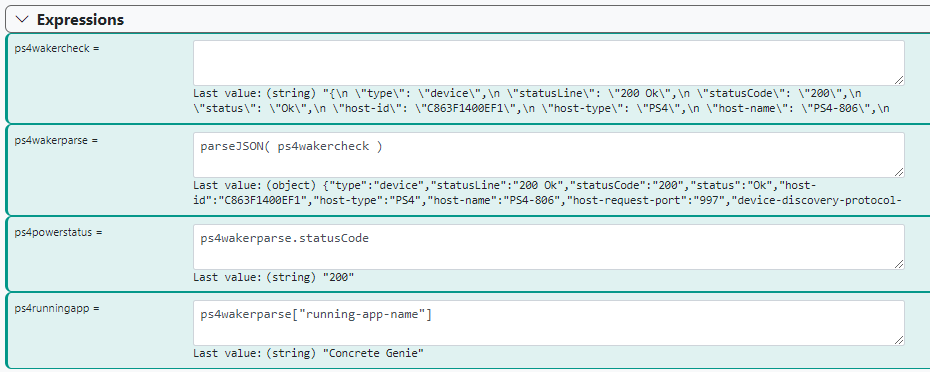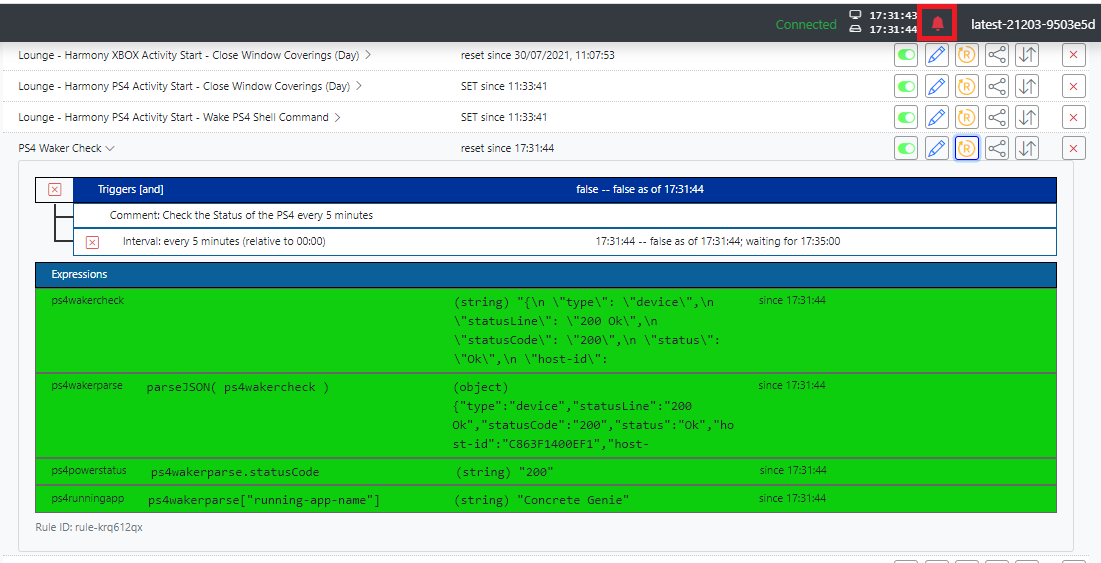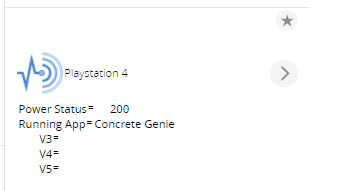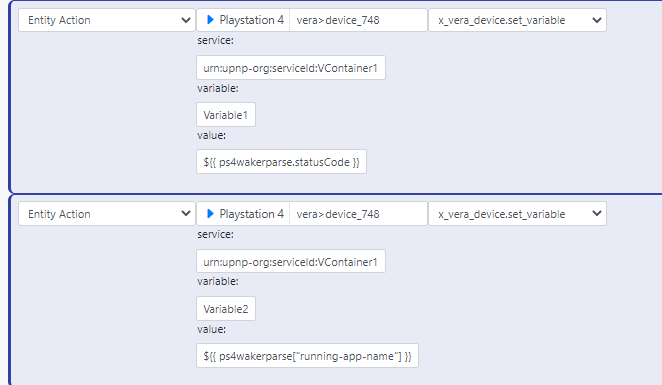Having issues with a shell command
-
Try running the command this way (yourself, in a shell, not in MSR):
ps4-waker check ; echo $?This will display the exit status of the command after it runs. You may need to run this repeatedly, under various different expectations of status, including testing when the device is disconnected/powered off, to get a complete feel for what shell exit status
ps4-wakeris returning under various conditions. Anything other than 0 is going to be a problem (it looks like an error). Using non-zero exit codes is a very common way for some utilities to return their status quickly so that shell scripts can make quick decisions without having to parse other data (like your output), so it's very likely that under some condition this script is working fine but returning non-zero. If that's the case, you're going to need a wrapper script to "deaden" the exit code.I've also just pushed up a new build to latest that has additional logging for this action, so you can try that as well and see if it gives any new information. I would not upgrade to latest in lieu of doing the above, as I cannot display the exit code (at least, not that I've found, as yet), so the above test is still a necessary important step. This will simply add stderr output to the logging (although I suspect the prior error messages already contain all the relevant output -- this is a safety/assurance that we're seeing it).
-
Try running the command this way (yourself, in a shell, not in MSR):
ps4-waker check ; echo $?This will display the exit status of the command after it runs. You may need to run this repeatedly, under various different expectations of status, including testing when the device is disconnected/powered off, to get a complete feel for what shell exit status
ps4-wakeris returning under various conditions. Anything other than 0 is going to be a problem (it looks like an error). Using non-zero exit codes is a very common way for some utilities to return their status quickly so that shell scripts can make quick decisions without having to parse other data (like your output), so it's very likely that under some condition this script is working fine but returning non-zero. If that's the case, you're going to need a wrapper script to "deaden" the exit code.I've also just pushed up a new build to latest that has additional logging for this action, so you can try that as well and see if it gives any new information. I would not upgrade to latest in lieu of doing the above, as I cannot display the exit code (at least, not that I've found, as yet), so the above test is still a necessary important step. This will simply add stderr output to the logging (although I suspect the prior error messages already contain all the relevant output -- this is a safety/assurance that we're seeing it).
When the Playstation is in sleep mode:
When the Playstation is turned on and running:
Your right the MSR rule is working and returning data only when the Playstation is turned on:
I thought it wasn't working when turned on but clearly it now is.
So because the exit code is a 1 when the Playstation is turned off that is why the MSR rule then does not return any data?
Thanks
-
That's correct. Any non-zero is an error. I will add a checkbox to the action to (optionally) ignore the exit code, and make that available in a build later today.
-
That's correct. Any non-zero is an error. I will add a checkbox to the action to (optionally) ignore the exit code, and make that available in a build later today.
That's great thank you.
Next problem how to extract the data from the in rule expression and split out the PS4's power status out in to another expression ?
I guess either "statusLine" or "statusCode" could be used.
(string) "{\n \"type\": \"device\",\n \"statusLine\": \"200 Ok\",\n \"statusCode\": \"200\",\n \"status\": \"Ok\",\n \"host-id\": \"C863F1400EF1\",\n \"host-type\": \"PS4\",\n \"host-name\": \"PS4-806\",\n \"host-request-port\": \"997\",\n \"device-discovery-protocol-version\": \"00020020\",\n \"system-version\": \"08520011\",\n \"running-app-name\": \"Concrete Genie\",\n \"running-app-titleid\": \"CUSA11875\",\n \"address\": \"192.168.0.201\"\n}\n"And you can see there is also a "running-app-name" Concrete Genie is the game being played currently.
-
Use another expression to put that string through the
parseJSON()function and it will turn it into an object you can then pick the data out of. -
Use another expression to put that string through the
parseJSON()function and it will turn it into an object you can then pick the data out of.@toggledbits said in Having issues with a shell command:
parseJSON()
Like this ?
Contents of the expression "ps4wakerparse"
Last value:(object) {"type":"device","statusLine":"200 Ok","statusCode":"200","status":"Ok","host-id":"C863F1400EF1","host-type":"PS4","host-name":"PS4-806","host-request-port":"997","device-discovery-protocol-version":"00020020","system-version":"08520011","running-app-name":"Concrete Genie","running-app-titleid":"CUSA11875","address":"192.168.0.201"} -
I don't know what the first expression is/was, but the second one is correct and has parsed the value correctly. You can now refer to data in the object via
ps4wakerparse.statusCodefor example. For names that contain special characters, likehost-id, you need to use the alternate (quoted identifier) syntaxps4wakerparse["host-id"] -
I don't know what the first expression is/was, but the second one is correct and has parsed the value correctly. You can now refer to data in the object via
ps4wakerparse.statusCodefor example. For names that contain special characters, likehost-id, you need to use the alternate (quoted identifier) syntaxps4wakerparse["host-id"]Seems to be working and pulling out the required data:
The first expression named "ps4wakercheck" is the inital output of the shell command "ps4-waker check".
-
OK. I see that it's not consistently clearing the error from some prior usage on
ps4wakercheck, that's what's confusing/odd, so I've fixed that for today's build as well (PR 0000235). -
By the way, it's much more efficient to use expressions in
ps4powerstatusandps4runningappthan it is to use Set Variable actions to set them. That's kind of doing it the hard way. -
By the way, it's much more efficient to use expressions in
ps4powerstatusandps4runningappthan it is to use Set Variable actions to set them. That's kind of doing it the hard way.For the value in the expression "ps4powerstatus" its either going to be:
200 = ON
620 = OFFHow can I have another expression that will translate those code numbers in to human text that I can then send to Vera / Home Remote ?
Thanks
-
By the way, it's much more efficient to use expressions in
ps4powerstatusandps4runningappthan it is to use Set Variable actions to set them. That's kind of doing it the hard way.@toggledbits said in Having issues with a shell command:
By the way, it's much more efficient to use expressions in ps4powerstatus and ps4runningapp
Understood I have changed it and removed the set variable actions:
EDIT:
Don't think it likes that, I get these error when I press the "Reset" button on the rule.
-
That's right.
Show all the values when you post an error, please.
-
No errors there.
-
Have you removed the Set Variable actions?
-
Have you removed the Set Variable actions?
@toggledbits said in Having issues with a shell command:
Have you removed the Set Variable actions?
Yes
The bell icon goes red when the rule is Reset.
-
Removing the actions is/was correct. I'll give this a try later today and see
-
Using a Vera Multistring plugin device.
I added these in the rules Reaction to send the values to the generic sensor device in Vera etc.
Just need to translate codes 200 and 620 to "On" and "Off" instead.
I could maybe delete these two expressions from the rule also.
EDIT:
I've just seen a new field called "status" maybe I can use that instead.
On = "OK"
Off = "Standby"
-
I had a moment to do a quick test. Duh; I'm forgetting my own code's behavior. This is actually pretty simple. When you reset the rule, all state and expression/variable values are removed, so effectively, everything is null. When the rule is then re-evaluated, expressions are evaluated first, and since
ps4wakercheckis null at that point because the action has not yet run, thenps4wakerparseis also null, so the last two expressions can't dereference through null and throw an evaluation error. This is actually all expected, correct behavior.You can probably just clear these two spurious errors (caused by the reset/no data condition at rule "boot"), as they will not happen again, typically. The only other way you would see this is if the command actually fails hard in some way and produces no parseable JSON output. Then you'll get alerts again, but that's probably good because you might want to know that.
Another way to handle it is to simply modify the last two expressions like this:
- ps4powerstatus =
ps4wakerparse?.statusCode - ps4runningapp =
ps4wakerparse?["running-app-name"]
The
?.and?[operators, described in the docs, are special coalescing versions of the standard.and[operators that guard null on their left-hand operands. If the left-side operand value is null, the coalescing operator will simply return null and no error will be issued. I think this also makes sense in this application. These coalescing operators are provided for exactly this kind of case, so this is a perfect example of their use, and you should familiarize yourself with them (and apply them often). - ps4powerstatus =











